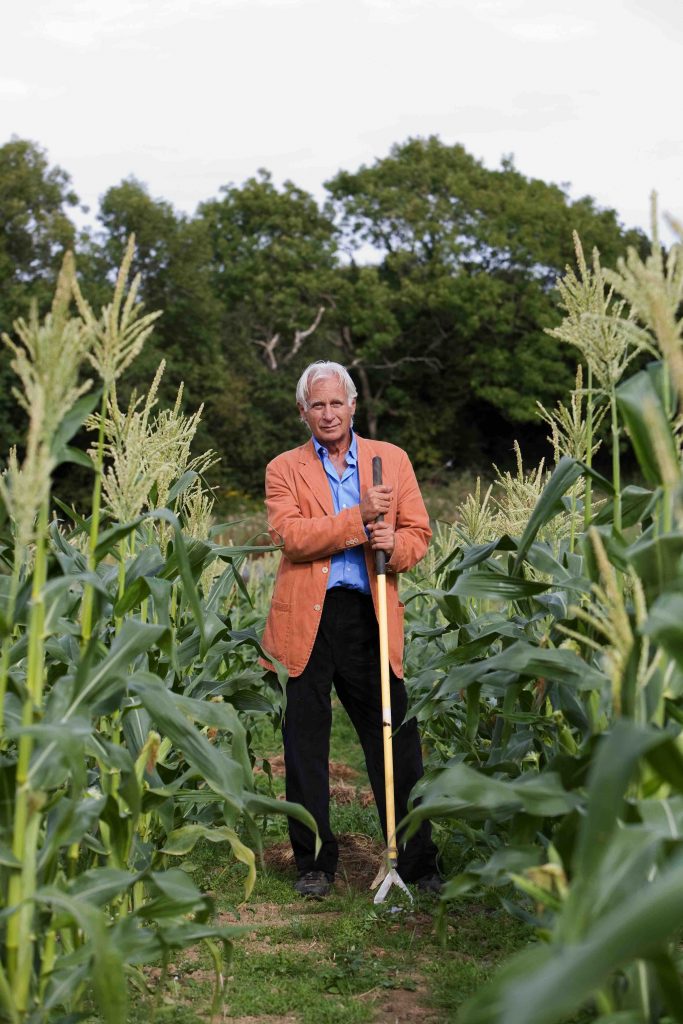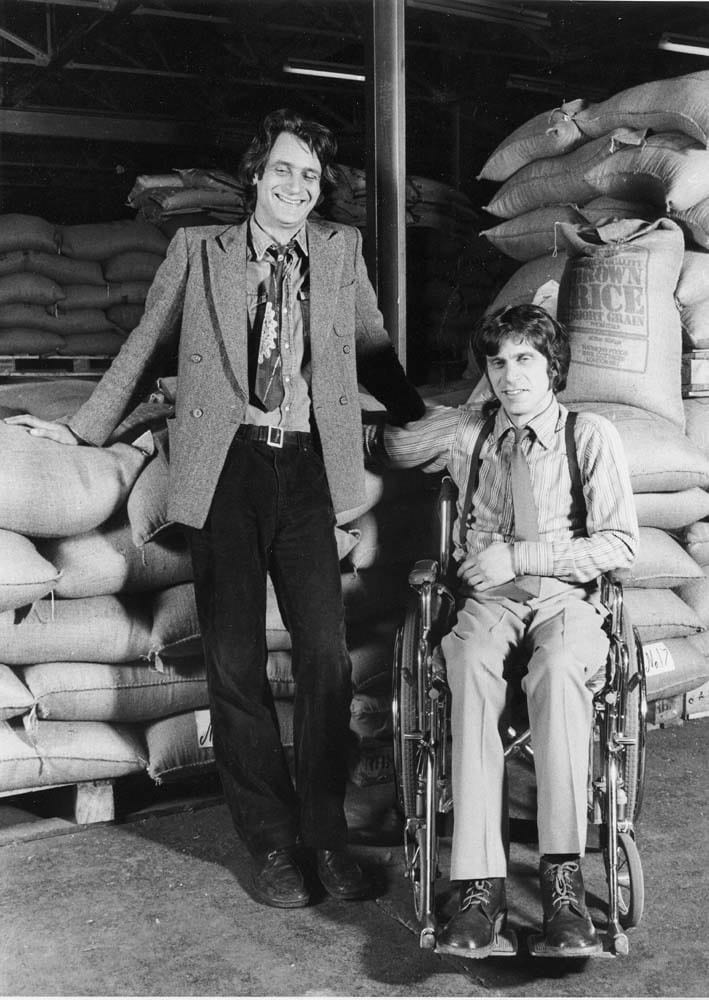Health Food Pioneer and Co-Founder of Green & Black’s Craig Sams Interview! Craig Sams is the creator of Gusto, and the co-founder of Green & Black’s luxury chocolate and Whole Earth Foods…

Craig is a health food pioneer and a key player in the organic/ wholefood movement. Craig Sams is credited with helping “to kickstart the vegetarian food market in Britain”. I’m very excited to share an exclusive interview with Craig, to share some of his adventures from eating a macrobiotic diet in the 60s, to the very first Glastonbury and a few pearls of wisdom…
As well as being the co-founder of Green & Black’s and Whole Earth Foods, Craig also launched the UK’s first ever vegan and macrobiotic restaurant. Craig cured himself (macrobiotically) of a life-threatening illness and advises the UK’s major supermarkets on how to go organic.
Health Food Pioneer
Craig invented Gusto for a party at the Groucho Club celebrating Whole Earth’s 20th anniversary – and it immediately became an insiders’ hit with the rave crowd of the late 80s. Gusto is a game changer for the drinks market, as consumers increasingly look for healthy, natural and ethical alternatives to traditional fizzy drinks. Without further ado, here’s a very exciting interview with health food pioneer Craig Sams…
Craig on Gusto Organic…
Gusto was originally a non-alcoholic drink created for a party at the Groucho Club to celebrate 20 years of Whole Earth Foods. The dress code was ‘Summer of Love or Black Tie’. I made up a blend of guarana, ginseng, Siberian ginseng and a Chinese herb blend known as “Free and Easy Wanderer’ and it went down very well. I had the concentrate left over and my daughter and son would take it to raves and enjoy the music and dancing, without suffering the mid-week comedown of people who took ‘E’.
Then my daughter Rima suggested that she market it and Gusto Original Energy was born and her brother joined her in the business. It sold very well everywhere – from Holland & Barrett stores to Amsterdam coffee shops. They sold the business in 2002. The new owners didn’t succeed with the brand, so I bought it back ten years later and relaunched the range.
What inspired you to set up your new organic drinks business?
A lot of the ingredients we had used originally were now available in organic format as well as from Fairtrade sources. We knew there was still latent demand for the formulations and noted the underlying megatrend away from alcohol and towards more sophisticated soft drinks. One in three young people now don’t drink at all and those that do are drinking less. So, we relaunched the original recipe and added three cola variants as well as a blood orange, ginger-chipotle and lemon-yuzu flavours. They are all on a roll and we have just overshot on our Crowdcube funding effort by more than double.
Macrobiotic Diet
Could you tell us about your journey to becoming such a key figure in the organic/ wholefood movement, how did it all begin?
I got into the macrobiotic diet back in 1965 when it helped me recover from a serious case of hepatitis and dysentery. That was in Kabul, at a time when it was a much more peaceful place. I still stick to a relaxed form of the diet and haven’t had to see a doctor since that time.
“I got into the macrobiotic diet back in 1965 when it helped me recover from a serious case of hepatitis and dysentery.”
Co-Founder of Green & Black’s
I opened a macrobiotic restaurant, my brother joined me in the business and we soon had Ceres Grain Shop, Britain’s first natural food store, then a wholesale business called Harmony Foods, then manufacturing and eventually to Whole Earth peanut butter and Green & Black’s chocolate. We had to do a lot of education so we also published a magazine called Seed, The Journal of Organic Living that set out the wider aspects of the organic lifestyle.
Health Food Pioneer
You launched the UK’s first ever vegan and macrobiotic restaurant, serving food to Marc Bolan, John Lennon and Yoko Ono. What’s your most exciting memory of this time? (top 3 if it’s too tough to pick just one!)
My brother Gregory had a good rapport with John. Yoko was a good friend and had been one of the first customers in our original restaurant, almost a year before she met John. John was a great fan of Gregory’s magazine ‘Harmony’ and gave him a lovely cartoon strip illustrating how he and Yoko had gone from being tired to floating on a cloud waving down saying “thanks Greg!”

Mark Bolan used to avail himself of our free meal offering of brown rice and vegetables and on one visit to Seed, our restaurant, he met Mickey Finn. They hit it off and went on to form T Rex.
Our restaurant was also our base for doing the food at the first Glastonbury Fayre back in 1971. By the Sunday the hot dog and burger vans turned up because they’d heard there were close to 10,000 people at the farm. The festival goers blocked their entry and shouted ‘out, out, out’ until they went away. That first Glastonbury was magical in all sorts of ways and that was just one example of how solid we were in our commitment to an alternative lifestyle.
How do you see the organic/ wholefood movement changing in the next 5 years?
The big change that is coming down the line is carbon pricing. Most people would prefer to eat organic food but baulk at the slightly higher price. When farming has to incorporate the cost of carbon in their costs, nitrate fertilisers, fungicides and herbicides will be twice as expensive.
Organic farmers, whose practices actually take carbon dioxide out of the atmosphere and lock it in the ground as organic soil carbon will be paid for the carbon ‘crop’ they are harvesting. That means organic food will mostly be cheaper than the industrially produced stuff. How many people will insist on pesticide residues and degraded farmland when they have to pay extra for it?
Any pearls of wisdom for those thinking of starting their own organic/ wholefood business?
Don’t try to do everything. There are plenty of ways to outsource to people who can do something more cheaply and efficiently than you can. Set your prices at a realistic level – profit is sanity, volume is vanity.
Make the best possible product using the ingredients available – the days of cost-cutting and cheap food of poor nutritional value are behind us, people understand what’s good and what’s not and consider that more important than cost.
If you have a story to tell about your products, tell it well – people care about the origin of their food more than ever; if they can’t get it hyperlocal then they want to know where it came from and who the producers are and how they are treated.
“We are all connected more than ever these days“
– Craig Sams
Special thank you to Craig for taking the time to share his story.
Christine





Leave a Reply